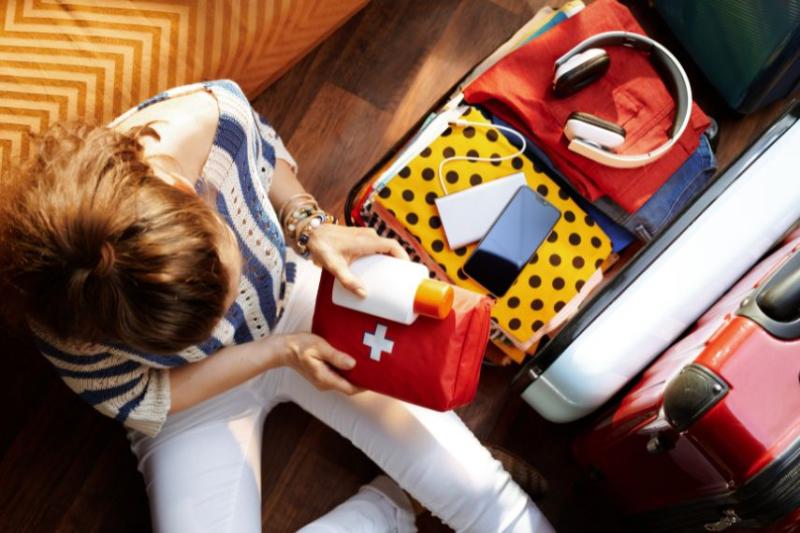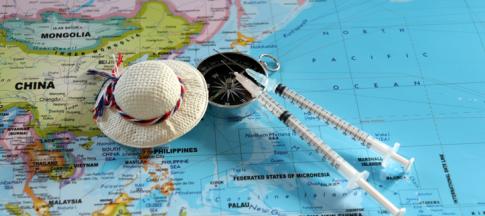
Some countries restrict bringing particular drugs across their borders, and your medicine might have specific requirements for packing and storing it.
This guide covers everything you need to know about travelling with medicine.
Checking your medicine is legal to travel with
Different countries have different laws and regulations about medicines.
If you take a medicine that contains a ‘controlled drug’ – one that the Home Office features on its controlled drugs list – you need to be able to prove the drug has been prescribed to you to be able to travel with it.
There are five schedules (tiers) of controlled drugs on the list. It’s a list of the scientific names of drugs that medicines may contain, not a list of medications. You’ll need to cross-check the list of ingredients on your medicine packaging with the list.
Drugs listed as Schedule 1 on the controlled drugs list are usually illegal to travel with. If your medication contains drugs in this category, talk to the Drugs and Firearms Licensing Unit before making travel plans.
What to do before travelling with controlled drugs
If you’re travelling for less than three months with drugs listed as Schedule 2, 3 or 4 on the controlled drugs list, your proof of prescription should be a letter from the qualified doctor who prescribed your medicine.
Make sure this letter includes:
- your full name
- the countries you’re visiting
- the dates you’ll be visiting them
- a list of your medication, including the quantity, dosage and strength
- the signature of the health professional who prescribed your drugs
If you’re travelling for three or more months with medicine containing controlled drugs, you will need to apply for a license.
You can do this by filling in a personal import/export license application form, which is free to download on the government website.
If you need a license, apply for it as early as possible – it can take at least ten days to be granted.
You'll also need a license if you’re travelling for less than three months but bringing a supply of controlled drugs that would last you three months or more.
Foreign countries with strict regulations
Certain countries have particularly strict drug and medicine regulations.
Some popular examples are:
The best way to make sure you carry restricted substances legally when crossing borders is to contact the embassy of the country you’re travelling to.
Contact details are on the UK government’s online list of foreign embassies.
Advice for travelling abroad with medication
When travelling with medicine, you should bring:
- proof of your prescription – to prove it’s your medication if you’re questioned
- your medicine’s original packaging and information leaflet– this should include the generic name of the medication (not just the brand name) and the details of what drugs they contain
This information is important if you’re stopped at customs, but it could also help doctors provide the right treatment if you have medical issues on your trip.
Consider having the information translated into the local language.
Flying with medication
There are a few things to think about before flying with medication:
- Keep your medicine in your hand luggage, as there’s a lower risk of being lost in transit. Some airlines might have regulations against this, so check before flying and keep a copy of your prescription on hand.
- Or consider splitting your medicines across bags so that if one goes missing, you’ll still have some available.
- If you have liquid medicine, check if it’s over 100 millilitres (ml) – if it is, you’ll need to contact your airline and all airports you’ll travel through to check their regulations.
How to travel with medication that requires refrigeration
Some medicines need special storage conditions. Your pharmacist or doctor can give you specific advice on how to store your medicine – in some cases, it’ll need to be refrigerated.
A solution can be:
- insulated pouches
- cool bags
- thermos flasks
Always speak to a professional to make sure you’re using the proper storage method.
If you need more advice, read our guide on travelling with medical conditions.
MoneyHelper Directory
If we can’t cover your medical condition, you can use the MoneyHelper directory to find a specialist insurer who might be able to cover you if you’ve been:
- Refused travel insurance or had your policy cancelled
- Offered cover with a medical exclusion that you can’t remove from your policy
- Quoted a price for a travel insurance policy with high medical costs
MoneyHelper makes it easier to find and compare policies you can afford that cover your condition and medical needs. Access the MoneyHelper directory online or call MoneyHelper on 0800 138 7777 (phone lines are open Monday to Friday, 8:00am to 6:00pm, excluding bank holidays).


